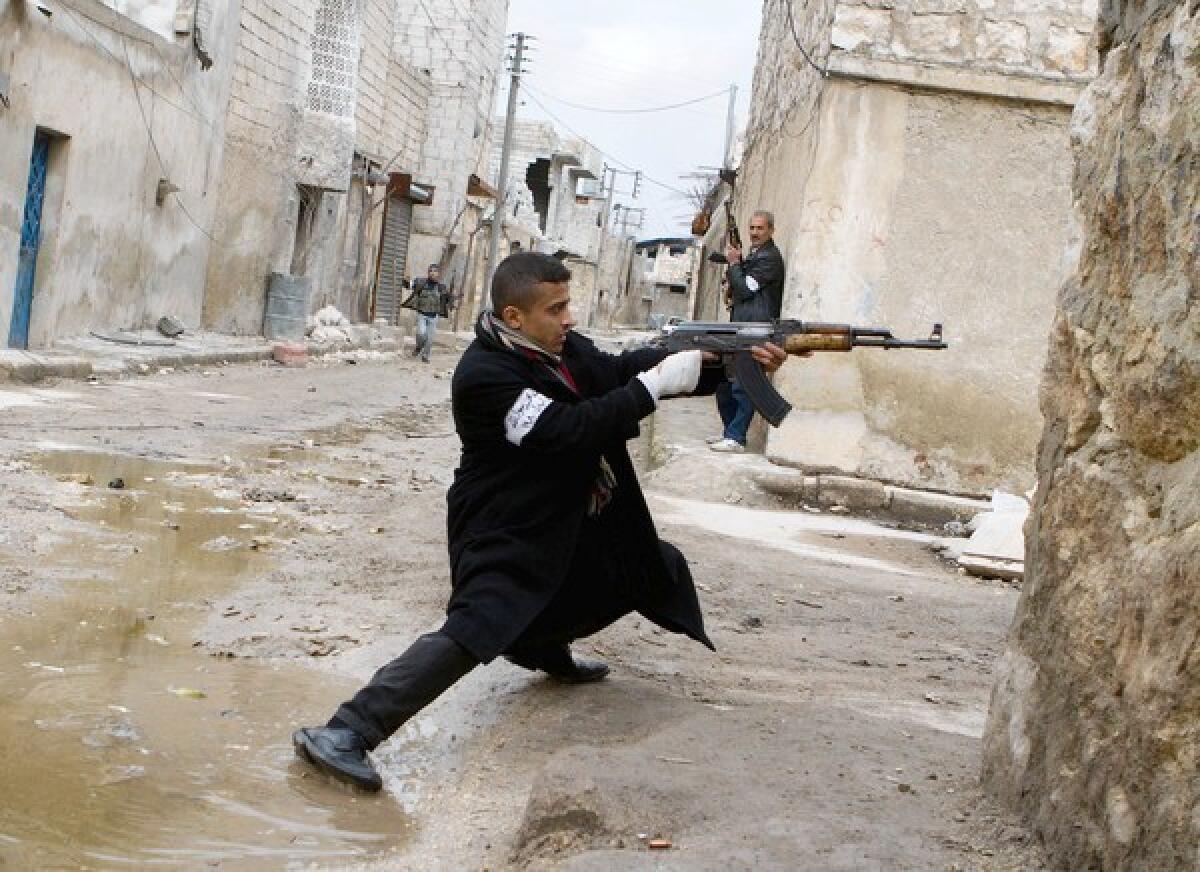Syria rebels claim to have taken city of Raqqah

- Share via
BEIRUT— The Syrian opposition said Monday that rebel fighters had taken control of much of the north-central city of Raqqah, where video showed jubilant residents toppling a statue of former leader Hafez Assad, father of the president.
The capture of Raqqah, if confirmed, would mark the first time in the nearly 2-year-old war that rebels had won control of a major city and a provincial capital.
Meanwhile, the Iraqi government reported that at least 40 Syrian soldiers who had taken refuge across the eastern border in Iraq had been killed in an ambush. The soldiers were apparently being transported back to Syria when unknown gunmen attacked them. Some Iraqi personnel accompanying the soldiers were also killed, according to news agencies.
The incident is the most dramatic illustration to date of how the Syrian conflict has spilled over into Iraq.
The government in Baghdad fears that such spillover violence could undermine the shaky stability of Iraq, which is still recovering from the aftermath of the U.S.-led invasion in 2003 that resulted in the ouster of President Saddam Hussein. Many residents of the Iraqi province of Al Anbar, which borders Syria, sympathize with rebels there seeking to overthrow President Bashar Assad. Fighters and weapons from Iraq are said to have entered Syria across the porous border.
Opposition reports from Raqqah indicated that there were still pockets of government resistance but that insurgents had overrun much of the city, including security installations and the central square, where the statue was pulled down.
“Few parts of the city are still under regime control,” said the Syria Observatory for Human Rights, a British-based pro-opposition group.
There was no confirmation from Syrian officials about the fighting in Raqqah, about 300 miles northeast of Damascus, the capital.
Unverified video said to be from Raqqah shows residents using a rope to bring down the bronze statue of the late Hafez Assad, who was succeeded after his death in 2000 by his son. The statue crashes into a fountain, where people begin to pummel it with shoes and clamber atop it while shouting pro-rebel slogans.
The Raqqah region sits strategically between two provinces, Aleppo to the west and Dair Alzour to the east, where battles have been raging.
Situated along the north bank of the Euphrates, the city of Raqqah has reportedly seen its population swell to more than 500,000 because of the influx of people displaced by fighting elsewhere in Syria. Some residents had publicly pleaded with the rebels not to attack the town, because of the likelihood of civilian deaths.
The city has been the site of antigovernment protests but also had a substantial pro-Assad population. In late 2011, as the rebellion was gaining steam in various parts of Syria, Assad visited the town on a major Muslim holiday, in what was seen as a gesture of gratitude to a loyal province.
But in September, rebels seized the provincial border town of Tal Abyad, along the Turkish frontier north of Raqqah, and began to push south. Last month, the opposition reported that rebels had seized several major dams along the Euphrates in Raqqah province.
It was not clear if the Syrian military had put up a full-fledged defense of Raqqah or had retreated. There were reports of government mortar strikes into the city as the rebels advanced.
Fighting has raged in several regions of Syria, including near Damascus, inside the city of Aleppo and in the central city of Homs. Many analysts have speculated that the Syrian military, battered by casualties and defections and forced to defend numerous fronts, may be stretched thin. The government has not released figures for soldiers killed and wounded in the conflict.
More to Read
Sign up for Essential California
The most important California stories and recommendations in your inbox every morning.
You may occasionally receive promotional content from the Los Angeles Times.










